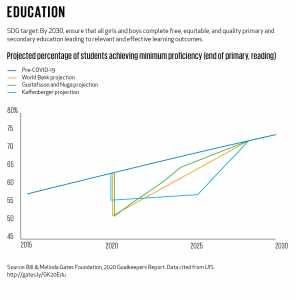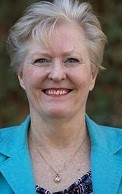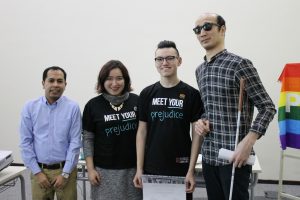As world leaders prepare to participate in the United Nations General Assembly, the Gates Foundation has released its 2020 Goalkeepers Report.
Focusing on a subset of indicators and themes featured in the UN’s 2030 Agenda, it looks to trace progress on key issues linked to the work of the Foundation, in particular health, poverty, education and equality.
These are, of course, also areas which can be determining for overall development – illness, low-education, and the exclusion of whole parts of any population represent a serious drag on progress in any society.
The Report has received widespread attention in the media, especially that focused on development, with its warnings around the risks that the COVID-19 pandemic poses to progress towards achievement of the Sustainable Development Goals (SDGs).
For libraries, as institutions committed to promoting progress in the communities they serve, the report is worth reading in order to understand the state of the world now. A number of conclusions in particular stand out – this blog explores just five:
The COVID-19 Pandemic stands to send us backwards in delivering on the 2030 Agenda: the first five years of the SDGs had, at least until the arrival of the pandemic, seen useful progress in fighting poverty and disease around the world. However, as the Report underlines, this progress has stopped in many areas. Indeed, we risk seeing 25 years of progress disappear in the space of 25 weeks when it comes to vaccinations. This needs to serve as a wake-up call for all those working to deliver stronger, fairer, more sustainable societies – we need to be careful to ensure that this set-back is not permanent.
We are facing a set of ‘mutually exacerbating catastrophes’: the Report underlines that the crisis is a complex one. While the immediate challenge is of course to restrict the spread of the virus until a vaccine can be found and deployed, there are already economic, social and educational catastrophes. Indeed, the loss of livelihoods, closure of schools and other steps may in turn create new health challenges outside of COVID-19, not least as concerns other vaccination and public health programmes.
The risks are highest for those already facing marginalisation: the Goalkeepers initiative, from its creation, has focused strongly on the situation of those most at risk of marginalisation. The 2020 edition underlines emerging signs that the pandemic will make inequality worse. For example, reduced demand and rules on distancing have made impossible many of the jobs – often informal – on which people facing poverty, and in particular women, depend. There are also concerns that when children start to return to school, girls will be held back, and of course children living in households without broadband access have been unable to benefit from distance learning in the same way as better connected peers.
In tough times, we cannot necessarily count on more money: the Report makes the stark warning that it is often the countries that need help most that are least able to provide it. Whereas already rich countries can borrow money for stimulus programmes, poorer ones face much higher interest rates, reducing their options. Yet even in richer countries, debts incurred today will need to be paid back tomorrow. Part of the response will, as the Report suggests, need to be a new mobilisation at the international level to get help to where it is needed. But implicit in this also is the need to make best use of the resources and infrastructures that we already have.
Libraries are in a position to help: in many of the areas highlighted by the report, the potential for libraries to contribute to the response is clear. Indeed, the support offered by the Gates Foundation over many years to libraries has made it possible to show what can be done. As pre-existing, familiar institutions around the world (there are 430 000 public and community libraries, one for every 15 000 people in countries for which we have data), working through libraries represents low-hanging fruit.
 The most obvious area where libraries can support progress is on education, where different projections all anticipate a drop in the share of children at the end of primary education able to read and understand a simple text. Clearly schools are at the heart of the response, but libraries can complement this by helping children engage with language from a young age, drawing on well-established expertise, as underlined by UNESCO.
The most obvious area where libraries can support progress is on education, where different projections all anticipate a drop in the share of children at the end of primary education able to read and understand a simple text. Clearly schools are at the heart of the response, but libraries can complement this by helping children engage with language from a young age, drawing on well-established expertise, as underlined by UNESCO.
Another potential area is reproductive health. Again, this is an area where health professionals themselves will take the lead, but where information – and access to this – is a key part of the response, as set out in IFLA’s response to a consultation by the UN’s Human Rights Council.
A third area is around financial services to the poor. Clearly, libraries themselves are not in a position to offer loans or protect savings, but can help provide the connectivity necessary for any digital banking services to reach people. The role of libraries in providing public access to the internet is well-recognised, and was even, in 2015, identified as the single most cost-effective way of bringing the next billion online.
There is much more in the Report, as well as great tools for exploring the data and understanding where your country stands on the indicators selected. There is also strong potential to draw on the key messages highlighted above, both to focus reflection within the library field, and underline how libraries can be part of the solution, if they are properly included in policy planning.
 se Nicholson, BA HDip Libr (UNISA); LLM (WITS) Scholarly Communications Librarian, University of the Witwatersrand, Johannesburg, South Africa
se Nicholson, BA HDip Libr (UNISA); LLM (WITS) Scholarly Communications Librarian, University of the Witwatersrand, Johannesburg, South Africa